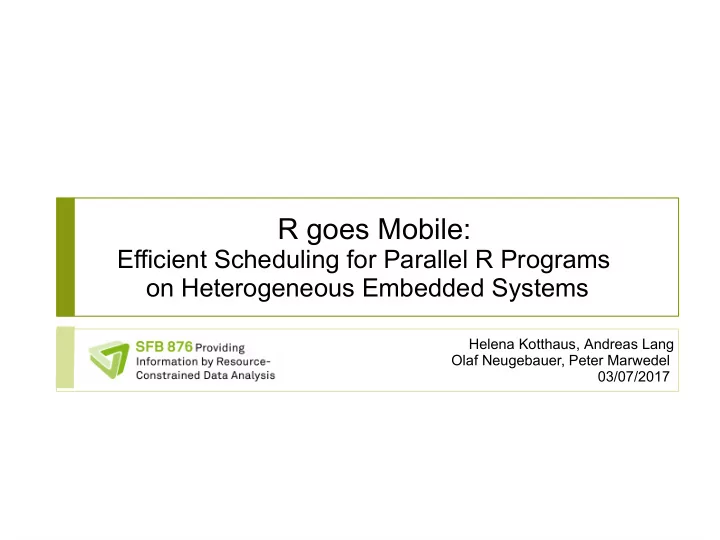

R goes Mobile: Efficient Scheduling for Parallel R Programs on Heterogeneous Embedded Systems Helena Kotthaus, Andreas Lang Olaf Neugebauer, Peter Marwedel 03/07/2017
SFB 876 Parallel Machine Learning Algorithms Challenge: Regression Model Propose Points Propose Points Find the best algorithm configuration x → Vast search space : x Algorithms + Evaluate Evaluate Specific parameters for each Update Model Update Model Parameter tuning can take weeks → Solution: Reduce evaluations with model based optimization Reduce runtime with efficient parallel execution → Enable larger problem sizes Goal: Resource-aware scheduling strategy for parallel learning algorithms Design Automation 2 Helena Kotthaus for Embedded Systems Computer Science XII
R goes Mobile - Parallelizing R on Heterogeneous Architectures Challenge: Running parallel R programs on mobile heterogeneous architectures → Tight resources and energy restrictions → Parallel execution can cause inefficient utilization → Different processors with different frequencies → No support Approach: Enable scheduling of parallel jobs to specific CPUs Use regression model for job runtime estimates Integrate search space exploration and scheduling Goal: Resource-aware scheduling strategies for parallel R program on embedded devices Design Automation 3 Helena Kotthaus for Embedded Systems Computer Science XII
Heterogeneous Architectures Odroid XU3 - Used in Mobile Phones ARM big.LITTLE System * 4 x big - Cortex A15 up to 2.0 GHz * 4 x little - Cortex A7 up to 1.2 GHz GPU: Mali-T628 * OpenGL ES 3.0/2.0/1.1 Memory: * 2GB LPDDR3 RAM Power Measurement Sensors: * 4 x TI INA231 (A15, A7, GPU, RAM) OS: * Linux and Android Design Automation 4 Helena Kotthaus for Embedded Systems Computer Science XII
Allocate Parallel Jobs to specific CPUs mclapply & mcparallel mcparallel Already supports allocation of jobs to specific CPUs with mc.affinity (R 3) Disadvantages → No controlled execution order → Low level mclapply More convenient But no support for mapping parallel jobs to specific CPUs New hmclapply Supports mapping to specific CPUs with cpu.affinity Controlled scheduling How to use hmclapply and what about the performance? Design Automation 5 Helena Kotthaus for Embedded Systems Computer Science XII
Allocate Parallel Jobs to specific CPUs Exemplary Variance Filter on a Matrix Design Automation 6 Helena Kotthaus for Embedded Systems Computer Science XII
Results on Heterogeneous Architectures: mclapply vs hmclapply Slow CPU 40 mclapply - variance of … 20 Fast CPU completion times → 257 (+/- 1.5) seconds 40 Fast CPU t Slow CPU 20 … hmclapply – balanced times 40 Fast CPU → 234 (+/- 1.0) seconds 40 Fast CPU t → Efficient job allocation optimizes the overall execution time Problem → Efficient scheduling needs to know the runtime of a job for each available processor type Design Automation 7 Helena Kotthaus for Embedded Systems Computer Science XII
Solution: Runtime Estimation via Regression Model → Execution times are estimated based on previously executed jobs and used to guide the scheduling on heterogeneous architectures Design Automation 8 Helena Kotthaus for Embedded Systems Computer Science XII
Performance Estimation to Prioritize Parallel Jobs Runtime Classification Error: Performance gamma gamma cost cost Short Runtime Short Runtime High Performance High Performance Design Automation 9 Helena Kotthaus for Embedded Systems Computer Science XII
R esource- A ware M odel- B ased O ptimization H. Kotthaus et. al.: RAMBO: Resource-Aware Model-Based Optimization with Scheduling for Heterogeneous Runtimes and a Comparison with Asynchronous Model-Based Optimization. Learning and Intelligent Optimization 2017 (LION 11) (accepted for publication) Design Automation 10 Helena Kotthaus for Embedded Systems Computer Science XII
Benchmark for the Heterogeneous Mobile Architecture Odroid Objective Function Ackley function Highly multi modal Goal: find the parameter configuration that produces the smallest y Runtime Function Rosenbrock function Smooth surface simulates execution times of parallel jobs Design Automation 11 Helena Kotthaus for Embedded Systems Computer Science XII
Runtime Estimation via Regression Model Rosenbrock 2D Function on Odroid Slow CPU Cortex A7 Fast CPU Cortex A15 Executed Runtime Executed Runtime X2 X2 X1 X1 Estimated Runtime Estimated Runtime X2 X2 Runtime of evaluated configurations X1 X1 Design Automation 12 Helena Kotthaus for Embedded Systems Computer Science XII
Scheduling Snippet Cortex A7 RAMBO Slow CPU Cortex A15 Fast CPU Cortex A7 DEFAULT Slow CPU Cortex A15 Fast CPU → RAMBO manages to balance parallel jobs more evenly on heterogeneous architectures Design Automation 13 Helena Kotthaus for Embedded Systems Computer Science XII
Who Finds the Best Configuration First? distance to optimum → RAMBO converges faster to the optimum (lower is better) on the heterogeneous architecture Design Automation 14 Helena Kotthaus for Embedded Systems Computer Science XII
Summary Efficient Scheduling for Parallel R Programs on Heterogeneous Embedded Systems CPU affinity parameter to allocate parallel jobs to specific CPUs Model for estimating execution times for different processor types Faster parallel machine learning on heterogenenous architectures We are also on github: TraceR Profiling for Parallel R Programs → https://github.com/allr/tracer Benchmarks → https://github.com/allr/benchR RAMBO – Ressource-Aware Model-Based Optimization → https://github.com/mlr-org/mlrMBO/tree/smart_scheduling Design Automation 15 Helena Kotthaus for Embedded Systems Computer Science XII
Recommend
More recommend